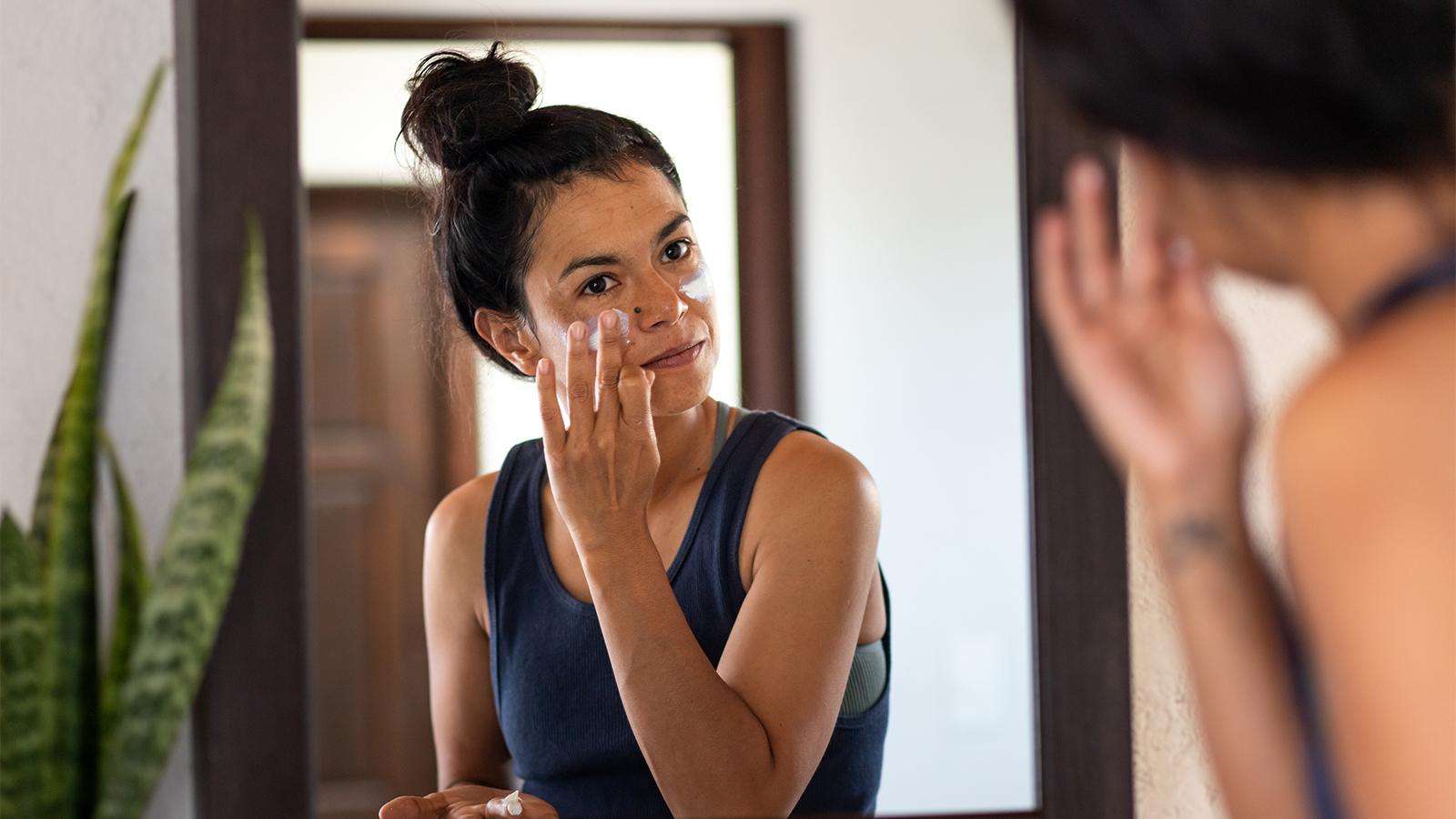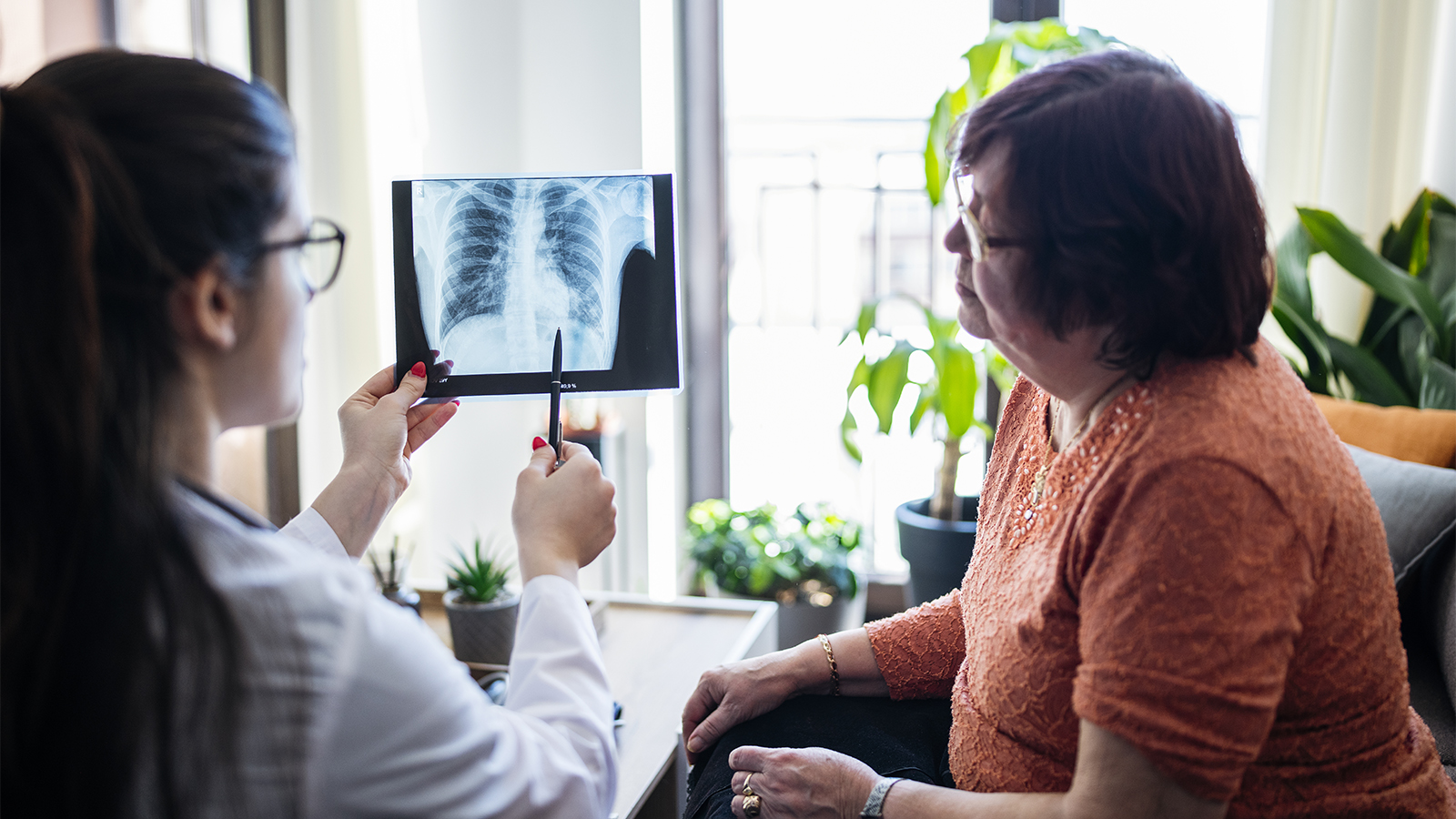Your Guide to Mammograms: When to Get Screened and What to Know
Understand the importance of regular mammograms. This guide explains why early detection is key, who should be screened, and what to expect during your appointment.

By Elizabeth Revesz, MD, Breast Surgeon, Virtua Breast Care
Why should I get a mammogram?
Mammograms are invaluable and lifesaving, as they can catch breast cancer early when it's most easily treated. A mammogram can detect a lump long before it can be felt during a physical examination, significantly improving your odds of survival.
Mammograms use X-rays to look for abnormal growths or changes in breast tissue and ducts. Since a mammogram is a screening tool, it can be used to find suspicious areas but not to diagnose breast cancer. Your health care provider will order other tests to make a definitive diagnosis.
When should I get my mammogram?
For women at average risk, the American Society of Breast Surgeons recommends:
- Women who don't have dense breasts: annual mammogram starting at age 40
- Women with increased breast density: annual mammogram starting at age 40 and recommended surveillance with breast ultrasound or MRI
For women with higher-than-average risk, recommendations include:
- Women with a genetic-based risk or radiation therapy to the chest between ages 10 to 30: Annual breast MRI starting at age 25 and annual mammogram starting at age 30
- Women with a lifetime risk of breast cancer greater than 20% or a strong family history of breast cancer: Annual mammogram and recommended surveillance with breast MRI starting at age 35
- Women with a history of breast cancer: annual mammogram and surveillance with breast MRI as advised by your doctor
Screening recommendations can be complex, so it's best to talk with your doctor about your medical history to learn when and how you should be screened for breast cancer.
What should I expect during a mammogram?
A mammogram takes about 20 minutes. While it briefly compresses the breast, the technician minimizes your discomfort. You're only exposed to a small amount of radiation, typically less than a standard chest X-ray.
Your first mammogram is a baseline used for comparison to your future mammograms.
If a suspicious spot is found, it doesn't mean you have cancer. Your health care provider will order more detailed screening tests, such as breast ultrasound or breast MRI. However, a breast biopsy is the only definitive way to make a diagnosis.
While it's easy to forget to make your mammogram appointment, it truly is your best defense against breast cancer. If you want to "memory proof" it, set an annually recurring reminder in your phone to schedule next year's appointment.
Schedule your mammogram today
- Request a mammogram appointment.
- If you have a mammogram order from your doctor, you can schedule your mammogram now.
- Learn more about Virtua's breast health program, which offers the latest imaging technology, including 3-D mammography, breast ultrasound, and MRI, and includes a high-risk breast cancer evaluation and surveillance program.
There's So Much More to Explore
Discover expert insights, inspiring stories, health tips, and more by exploring the content below!
Signs of Lung Disease: What Shortness of Breath Could Mean
How to Get and Stay Healthy This Fall

How to Reverse Prediabetes and Prevent Type 2 Diabetes

4 Sweet Halloween Tricks for Grown Ups Who have Diabetes

6 Ways to Get More Out of Your Daily Walk

Social Tips for Introverts: Finding Connection While Preserving Your Energy

Young Breast-Cancer Survivor Has New Hope for Healthy Future

HeartTalk Magazine

What To Know About Vaginal Discharge During Pregnancy

Is Cancer Hereditary? What You Need to Know About Your Genetic Risks

Tara's Story: From Debilitating Uterine Fibroid Pain to a Half-Marathon Medal

Is Your Post-Pregnancy Belly Bulge a Sign of Diastasis Recti?

Fall Vegetables: The Health Benefits and Recipes to Try This Season

Your Guide to Mammograms: When to Get Screened and What to Know

The Top 10 Foods That Boost Your Brain Health

Is It Safe to Exercise During Pregnancy?

10 Ways First-Time Moms Can Avoid a C-Section Delivery

Prevent Yard Work Injuries: Tips for Mowing, Gardening, and Raking

Where To Seek Mental Health Help And Treatment

5 Ways to Set Healthy Video Game Limits for Your Kids

Healthy Weight Gain During Pregnancy: A Guide for Moms-to-Be

How to Curb Nighttime Snack Cravings

Is Your Daily Walk Making You Really Sore?

IBS and Alcohol: Can You Still Enjoy a Drink?

Focus on Mental Health Is Key Part of Andrew's Weight-Loss Journey

What You Need to Know About Epilepsy

'Feeling Joy Again': ECT Brain Stimulation Therapy Restores Ashley's Well-Being

Lifesaving Heart Care Creates a 'Bond That's Never Left Us'

3 South Jersey Farmers Markets You Must Visit This Fall

How High Blood Pressure Affects Your Body

Not Just for Wrinkles: Botox Injections Promote Improved Bladder Control

Caring Maternity Team Transforms Harley's Pregnancy Crisis Into Lasting Memories

Robotic Hysterectomy, Trusted Care Help Bobbi Shine Again

Easy, Healthy Lunch Ideas for the Beach

Why Coffee Makes You Poop: A Comprehensive Guide

How to Stay Cool and Prevent Heat Illness All Summer Long

Do Not Get Burned by These Sunscreen Myths

Beat the Bugs and Save Your Summer

How to Have a Healthy Pregnancy if You're Overweight

Why You Get Sick on Vacation (and How to Stay Healthy While Traveling)

6 Hot Tips for a Safer Summer

4 Surprising Health Truths You Should Know

5 Interesting Facts About Your Heart

Is Low Sex Drive Normal? Revealing the Complex Causes of Low Libido in Women

CABG Surgery: What Women Should Know About Heart Health and Healing

5 Feel-Good Activities to Explore Around South Jersey

Stress Incontinence vs. Urge Incontinence: What's the Difference?

5 Key Facts About Proton Therapy for Cancer Treatment

3 Changes You Can Make Today to Lower Your Cancer Risk

A Lung Cancer Screening Could Save Your Life

Take Pride in our Health: Must Dos for LGBTQ+ Preventative Care

4 Foolproof Pelvic Floor Strengthening Exercises for Women

What to Expect During Perimenopause

Protect Yourself From Tick Bites and Lyme Disease

10 Quick Ways to De-Stress

4 Ways to Stay Fit and Healthy on a Budget

Do You Know the Signs and Symptoms of Uterine Fibroids?

How Are Uterine Fibroids Treated?

Can I Have Sex After a Hysterectomy?

From Restless to Restful: How Movement Improves Sleep

5 Simple Ways to Spring Clean Your Wellness Routine

What to Expect From a Robotic Hysterectomy

When You Need A Hysterectomy Know Your Options

10 Reasons To Schedule Your Colonoscopy Today

Take Control of Incontinence, Prolapse, and Other Pelvic Floor Disorders

How Can I Prevent Bone Loss and Osteoporosis?

Is an At-Home Colon Cancer Test a Good Alternative to a Colonoscopy?

The Truth About Menopause, Weight Gain, and Belly Fat

Shedding Light on Lesser-Known Menopause Symptoms and Solutions

Debunking The Myths About Vaginal Dryness

Best Foods for Kidney Health

What Causes Food Addiction And What Are The Signs

5 Essential Winter Foot Care Tips When You Have Diabetes

Advanced Minimally Invasive GYN Surgery Puts You at the Center of Care

Your 10-Point Plan to Avoid Winter Weight Gain

Colitis Symptoms Under Control, Jennifer Is ‘Living My Best Life’

Be Fast and Spot the Signs of Stroke

Surprising Symptoms May Signal Stroke In Women

8 Key Steps to Better Blood Pressure Control

5 Back Stretches for the Work-From-Home Workweek

The HPV Vaccine: A Powerful Shield Against Cervical Cancer

How Does Breast Density Affect Your Mammogram?

Menopause: New Insights Into the Power of Hormone Replacement Therapy

How to Prevent and Treat Urinary Tract Infections

One New Heart Valve Saves Two Lives in the Tritten Family

6 Numbers Key to Keeping Your Heart Healthy

4 Easy Ways to Treat and Prevent Runner's Knee

Breast Cancer Diagnosis Inspires Catherine to Help Others

Five Mindfulness Tips That Can Help Heal Your Heart
Working from Home? Take a Quick Break to Stretch Your Wrists

Love Your Heart: Essential Care Tips for Every Stage of Life

How Do I Measure My Blood Pressure at Home?

How Do I Improve My Cholesterol Levels?

3 Ways to Reduce Your Stroke Risk

How the Unique Stages of a Womans Heart Affect Her Health

Sarah Wins Back Her Health After Crohn's Disease Diagnosis
Firefighter's Successful Lung Cancer Care at Virtua

A Breast Self-Exam Saved Kristen's Life

How Sex Keeps You Healthy as You Age

Protect Your Child From HPV and Related Cancers

Why IUDs Might Be The Most Effective Birth Control

5 Things You're Too Embarrassed to Tell Your OBGYN

4 Not-So-Crazy Questions to Ask Your Doctor

What to Know About Cervical Cancer Screenings
6 Tips for an Easier Colonoscopy Prep

Rectal Cancer Surgery Gets Eileen Back to her Magical Life | Virtua Health
Robotic Surgery Helps Shelly Haney Return to Her Happy Place

